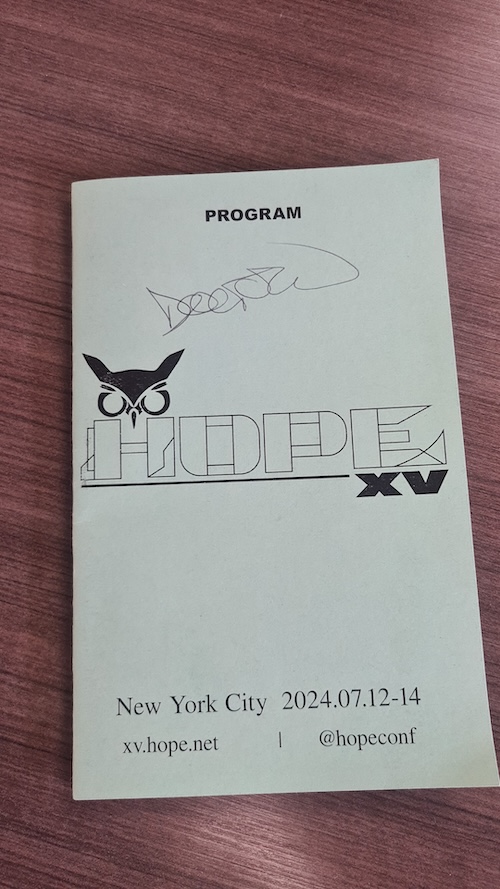
Posted
This article is the first part of my coverage of HOPE XV (the biannual Hackers On Planet Earth conference run by 2600 Magazine). I took a lot of notes during Cory Doctorow's keynote, "Enshittification: Why Everything Suddenly Got Worse and What to Do About It". His talk was pretty incredible, so I decided to flesh the notes out and post them here. I talked to Cory after the keynote to get permission to post this--and as a bonus, he signed my HOPE program! :)

Everything I've written comes directly from the talk, either paraphrased or a direct quote, excepting my own clearly-marked 'author's notes'.
There is a pandemic infecting companies, and its disease is called enshittification. Enshittification consists of four sequential symptoms that result in platforms being deeply unsatisfactory for all parties involved, yet somehow not dying. While it may seem like many platforms have only suddenly declined in quality recently, in reality, enshittification has been slowly creeping upon us over the past fifteen years. How is this possible? Let us take Meta as an example.
The first three symptoms of enshittification are as follows:
Meta started off as Facebook, a social media service exclusive to college students. When Facebook decided to open its services to everyone in 2006, it had to compete with established and highly popular platforms such as MySpace. Facebook drew users to its service and away from MySpace by promising better privacy and better quality content than MySpace, presenting itself as an underdog against a billionaire-owned competitor.
Once customers were drawn to and 'locked in' to this new service, Facebook began to focus on attracting business customers -- publishers and advertisers -- to its platform. It firstly did so by reneging on its promises of privacy and 'only showing you what you want to see', allowing advertisers to promote their products to hyper-specific demographics and cramming unwanted content into users' feeds. At this time, the price of advertising space was also very low. With record numbers of users on the platform and the low cost and perceived high value of advertising, business customers, too, became 'locked in' to Facebook.
To explain the third stage of enshittification, it is first necessary to discuss the concept of algorithmic wage discrimination. This concept can be best exemplified by Uber's wage algorithm for their drivers. Drivers who are more selective with the trips that they accept are paid more per trip, whereas those who accept more trips have their wages randomly and incrementally lowered. Algorithmic wage discrimination has thus been a very effective measure for trapping the most desperate drivers on the platform for the lowest possible wage. The digital flexibility that Uber has -- the ability to quickly modify their backend -- has proven to be very conducive for enshittification of Uber and other companies, including Meta. Once Facebook's market dominance came to fruition, they started making the same incremental negative changes to their business customers that they had made to their end users. Over time, they jacked up the price of advertising on the platform. When publishers started threatening to leave the platform, Facebook would manipulate their advertising presence, increasing their advertising impressions by the millions, to entice them to stay.
The fourth stage is more concise: panic, or as Meta and other enshittified companies prefer you to call it, a 'pivot'. As Facebook received more and more bad press -- from lying to end users and spreading misinformation, from exploiting them for profit (see: Cambridge Analytica), from manipulating their advertisers -- they had to radically switch their image and strategy to distract from the increasingly bad quality of their platform. Their incredible idea? Renaming themselves after the metaverse and attempting to sell everyone the idea of hanging out in a primitive, low-poly virtual reality with zero practical purpose. Now all parties, the company, business customers and end users, are unhappy, but all are stuck. (Author’s note: for more examples of the panic/pivot stage, just look at every Big Tech company’s implementation of LLMs into their products)
Facebook has been worsening for a while, but this issue is not exclusive to Meta. Many companies, particularly Big Tech companies, have been enshittified over time. This would seem to imply that there are exogenous forces causing mass enshittification, but more accurately, there were historically external forces preventing enshittification which have slowly lost their effectiveness.
Next Page